Chalk the Dale on July 29
- Details
- Written by: Joanne Wallenstein
- Hits: 2054
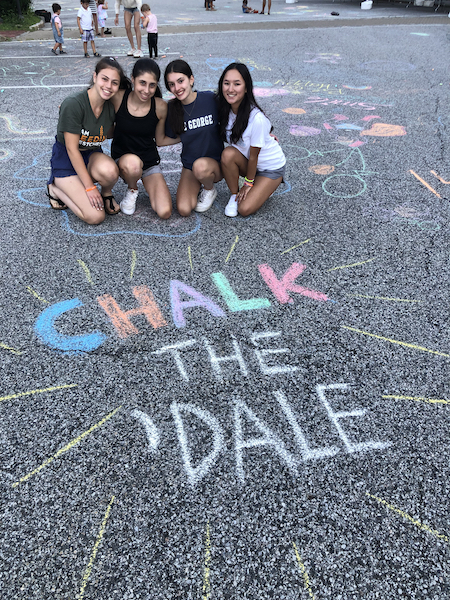 Chalk the ‘Dale will be back by popular demand during the 2022 Scarsdale Village Summer Sidewalk Sale. The 2022 Scarsdale Village Summer Sidewalk Sale will take place Thursday, July 28th through Saturday, July 30th, from 10am-6pm, rain or shine.
Chalk the ‘Dale will be back by popular demand during the 2022 Scarsdale Village Summer Sidewalk Sale. The 2022 Scarsdale Village Summer Sidewalk Sale will take place Thursday, July 28th through Saturday, July 30th, from 10am-6pm, rain or shine.
Bring your family on Friday evening, July 29th, from 6pm-8pm to Boniface Circle to Chalk the ‘Dale (Rain date: Saturday, July 30th). Back by popular demand, this exciting family event, produced by the Scarsdale Youth Business Alliance (SYBA), is designed to bring the community together and add vibrancy to our Village center, while fostering creativity.
Scarsdale residents are invited to create chalk art on Boniface Circle.
To participate, residents should sign up here. The $10 participation fee will be used to support the SYBA.
At 6pm, participants may check in and receive their chalk at the intersection of Spencer Place and Boniface Circle, which will be closed to vehicular traffic. Pizza by the slice and water will be sold starting at 5:45pm.
The SYBA will also be offering family-fun activities in the Dine the ‘Dale tent on Saturday, July 30th from 11am-2pm. In addition, there will be face painting, a balloon artist as well as musical activities.
“We are thrilled to bring Chalk the ‘Dale back again this year to help strengthen our community and add vitality to our Village center,” said SYBA co-founder and rising Scarsdale High School senior Anna Feldstein. “Funds raised will contribute to SYBA’s growth, allowing us to support the broader community through our ongoing and future philanthropic efforts.”
Anna, along with her co-founder Zach Berman, created the SYBA as a student-run organization with the mission to support local businesses and reinvigorate the Village center through youth advocacy and engagement, and the promotion of teen foot traffic. The organization also helps the broader community by using Scarsdale Village to host philanthropic events. Their events and partnership with Feeding Westchester have provided over 3000 breakfast and lunch meals for children in need in youth programs across Westchester County.
For more information please contact info@scarsdalebusinessalliance.com.
Chalk the ‘Dale image from 2021 (photo credit - SYBA)
Pictured at top from left to right: Anna Feldstein, Campbell Alin, Julia Kent and Katie Han
A Festive Fourth at the Scarsdale Pool Complex
- Details
- Written by: Margot Diamond
- Hits: 2272
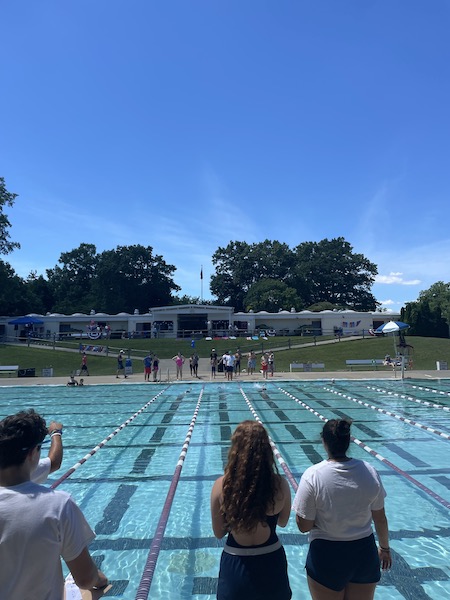 Pool lifeguards ran the swim races.The gorgeous July 4th weather allowed for a fun filled day of festivities at the Scarsdale Pool Complex. The program kicked off around 12pm with freestyle races in the main pool and a penny hunt in the baby pool. With events catered towards all ages, there were parent/child races and endless amounts of basketball dunk and shooting contests!
Pool lifeguards ran the swim races.The gorgeous July 4th weather allowed for a fun filled day of festivities at the Scarsdale Pool Complex. The program kicked off around 12pm with freestyle races in the main pool and a penny hunt in the baby pool. With events catered towards all ages, there were parent/child races and endless amounts of basketball dunk and shooting contests!
The pool fully decked out in red, white, and blue, with streamers, balloons, and pinwheels at every corner. The Scarsdale Pool lifeguards took on new roles as face painters, bubble blowers, swim race referees and new friends of the little kids.
Due to the pandemic, this event has not been able to run at full scale for two summers in a row, so the town showed their enthusiasm for the return of all the events and games the pool had to offer.
The biggest attraction was the bouncy castle located just next to the diving pool. Kids would run back and forth from the pool to the castle, creating hours of fun and high spirits for families of Scarsdale on the holiday weekend.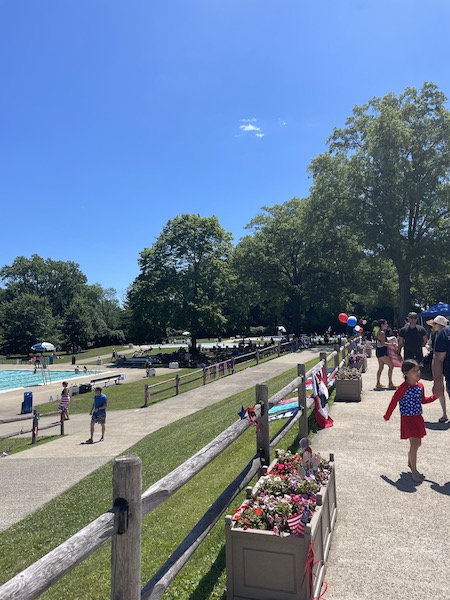 The pool was decked out in red, white and blue for the 4th of July.
The pool was decked out in red, white and blue for the 4th of July.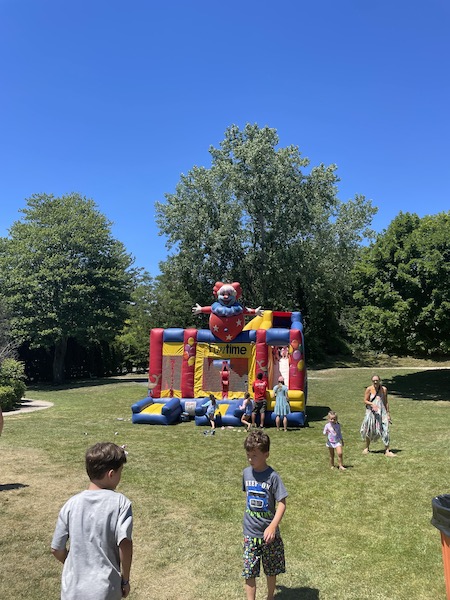 The Bouncy Castle was a hit for the youngest attendees.
The Bouncy Castle was a hit for the youngest attendees.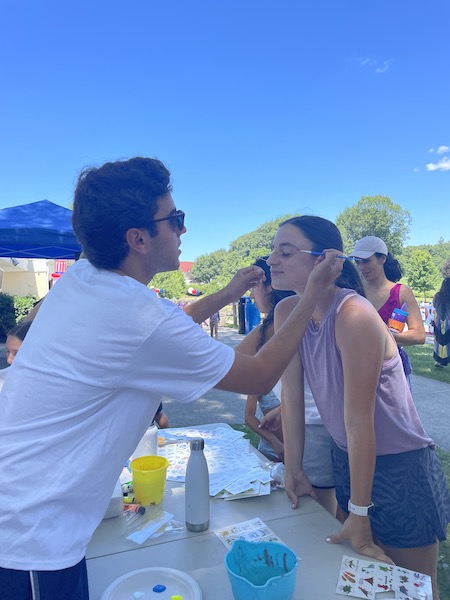 Scarsdale Pool lifeguard, Cyrus Toosi gives the author firework facepaint.
Scarsdale Pool lifeguard, Cyrus Toosi gives the author firework facepaint.
Join Greenacres Neighbors for July 4 Celebration
- Details
- Written by: Joanne Wallenstein
- Hits: 2384
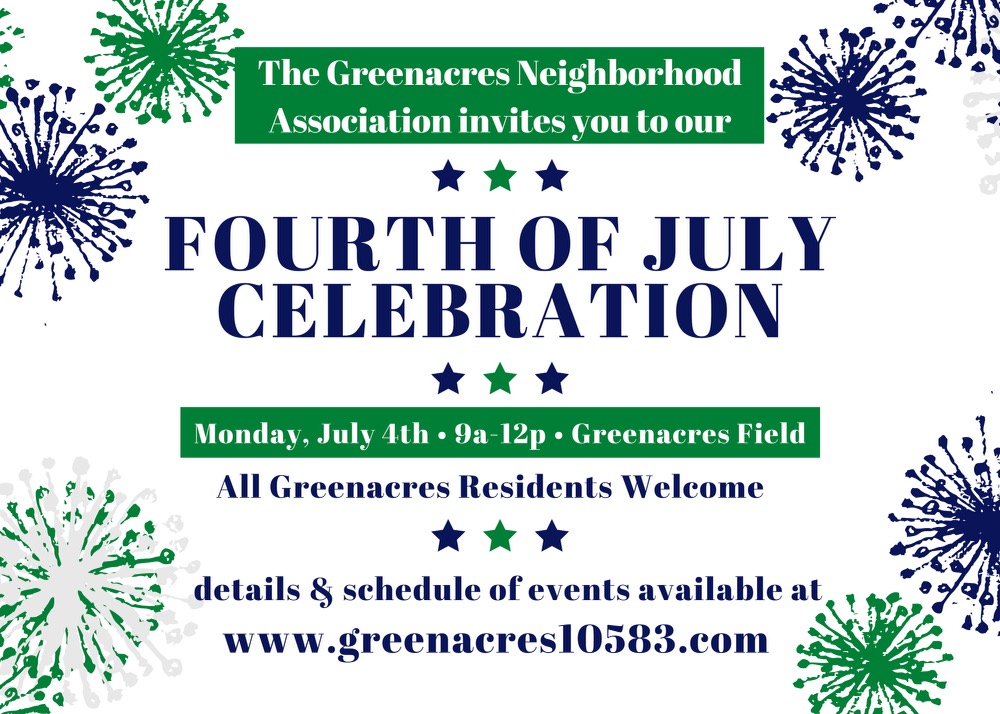 The Greenacres Neighborhood Association will relaunch its Fourth of July Celebration next week after a two year hiatus due to COVID.
The Greenacres Neighborhood Association will relaunch its Fourth of July Celebration next week after a two year hiatus due to COVID.
The celebration, from 9 a.m. to 12 p.m. on July 4, includes breakfast, games for all ages, a Color Guard presentation, patriotic program, the Greenacres Gallop and the Scarsdale Fire Department’s rainbow producing water display.
“After a two year hiatus, we are thrilled to bring together neighbors new and old to celebrate what makes our community so special,” said Andrew Sereysky, president of the Greenacres Neighborhood Association. “I can’t think of a better way to reactivate the Greenacres Neighborhood Association than our flagship Fourth of July festivities.”
The event is free and all Greenacres residents, students and faculty are invited to attend.
The Greenacres Neighborhood Association represents the entire area served by Greenacres Elementary School. It works to sponsor a variety of neighborhood events and provide information about local activities and initiatives.
For more information about the celebration and the GNA, visit greenacres10583.com.
Residents Weigh In On What They Would Like to See at the Scarsdale Pool Complex
- Details
- Written by: Joanne Wallenstein
- Hits: 1895
 What features would you like to see at a renovated Scarsdale Pool? A lazy river? A water slide? Water polo, expanded dining options? These are just a few of the possibilities under consideration by the Village as they explore the scope of a renovation of the Scarsdale Pool Complex. On Friday June 3 and Saturday June 4 and Saturday the consultants engaged with the public at the Scarsdale Pool and at the Music Festival. Participants were given stickers to mount on poster boards displaying many features to indicate their preferences.
What features would you like to see at a renovated Scarsdale Pool? A lazy river? A water slide? Water polo, expanded dining options? These are just a few of the possibilities under consideration by the Village as they explore the scope of a renovation of the Scarsdale Pool Complex. On Friday June 3 and Saturday June 4 and Saturday the consultants engaged with the public at the Scarsdale Pool and at the Music Festival. Participants were given stickers to mount on poster boards displaying many features to indicate their preferences.
The Village has also posted an online survey here that they encourage residents to complete.
Here is an update on the public engagement efforts for the Scarsdale Pool Complex project from Assistant Village Manager Alexander Marshall:
So far, the Village has received over 600 responses to the statistically-valid mailed survey, and nearly 800 online survey responses. We are hopeful that we will gain even more responses over the next week and a half before the online survey closes on June 17th. Upon closing of the survey, the consultants will begin synthesizing the results into a report for the first week of July. People can access the online survey using the following link: https://www.surveymonkey.com/r/VSPC-P
I also wanted to make you aware of the outcome of the recently held public engagement sessions regarding the Pool Complex Study on June 3rd and 4th. The consultants indicated that the general reaction to the community engagement sessions were very positive. Children and adults alike seemed to enjoy the dot voting activity and appreciated the opportunity to discuss the pool with the consultants firsthand. Here are some quick stats about the attendance at each session:
Friday June 3rd from 3-6PM at the Pool Complex: 50-60 direct engagements
Saturday June 4th from 9AM-noon at the Pool Complex: 50+ direct engagements
Saturday June 4th at the Scarsdale Music Festival: 200+ engagements
Based on conversations with participants, it is expected that at least 80% of the engagements were with Scarsdale residents. These engagements typically consisted of a quick summary of the pool study, promotion of the online survey, and instruction or guidance through the dot voting activity. In many cases, the conversations went further into Q&A, drivers of trends, suitability of various amenities, financial implications, and so forth.
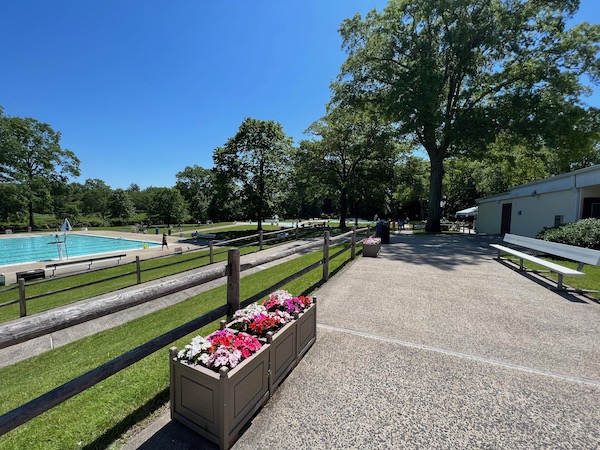
New Mural Unveiled at DeCicco's
- Details
- Written by: Margot Diamond
- Hits: 2732
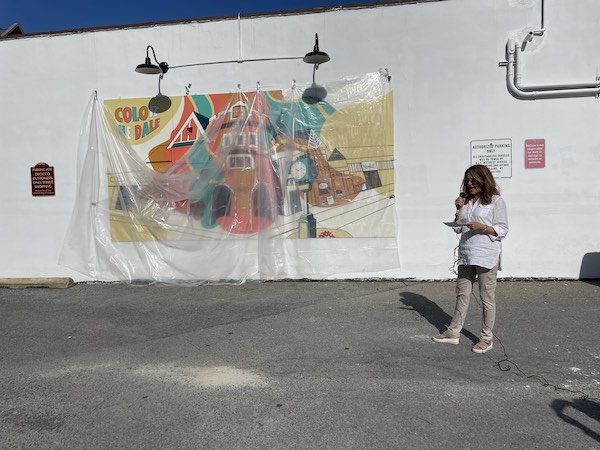 Amy Nadasdi gave opening remarks.On May 25th, 30 eager students from the National Art Honors Society club gathered in Scarsdale Village to unveil their vibrant new mural. The large, four-panel mural was designed and painted by Scarsdale High School’s chapter of the club and was sponsored by Frank DeCicco and DeCicco Family.
Amy Nadasdi gave opening remarks.On May 25th, 30 eager students from the National Art Honors Society club gathered in Scarsdale Village to unveil their vibrant new mural. The large, four-panel mural was designed and painted by Scarsdale High School’s chapter of the club and was sponsored by Frank DeCicco and DeCicco Family.
The “Wing The Dale” mural, which was mounted on East Parkway in 2019 brought color to Scarsdale Villageand showed off the work of SHS students. The initiative was delayed by the pandemic and 13 months later the work was unveiled. The mural takes the form of a coloring book, with bright blues and alluring orange color spilling into a black and white outline of the village. The mural lights up the simple white wall in the DeCicco's parking lot, and beautifully reflects not only the vibrancy of Scarsdale but the effort of the students.
Village Mayor Jane Veron expressed her enthusiasm and gratitude for the Scarsdale students at the mural unveiling. “We want to bring vitality and life to Scarsdale Village” she said, giving credit to Amy Nadasdi, a member of the Scarsdale Village Arts Advisory Council, for her hard work in leading multiple art projects and installations in Scarsdale. Nadasdi said “Collaborative public art is the best kind of art,” and she is hopeful that many more group projects will be realized.
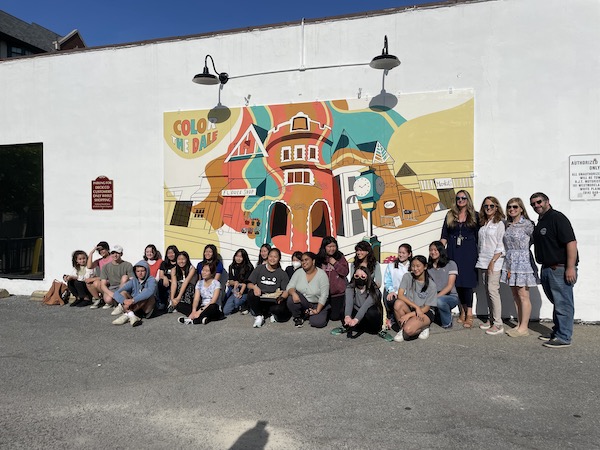 NAHS students, SHS teacher Janna Johnsen, Mayor Jane Veron, and Frank DeCicco in front of the mural.
NAHS students, SHS teacher Janna Johnsen, Mayor Jane Veron, and Frank DeCicco in front of the mural.
Also at the ceremony was Frank DeCiccio, who has been enthusiastic and passionate about the addition of a second mural. “After we did the Wing the Dale project three years ago, not only did I think it made the Village more appealing, I felt that having the students of the community involved gave it such a personal touch,” he said at the ceremony. He also remarked, “It is taking a vision of many students and capturing that moment in time”.
Leader of the SAHS club is SHS teacher Janna Johnsen, who praised the students for their dedication and persistent work on the mural. She said it was a “collective vision”, and that throughout the whole process they worked together to create “Color The Dale.”
Additionally, five new painted planters are displayed under the dining tent, joining six that were already revealed last year. The planters were made by students in the Advanced Topics 2D class and were sponsored by the Scarsdale Business Alliance.
Now multiple student driven art pieces in the village, have added color to the “Dale.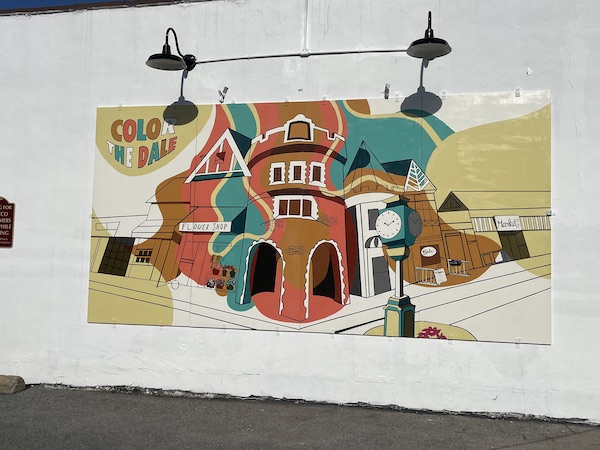 The new “Color The Dale” mural.
The new “Color The Dale” mural.







